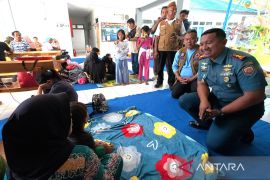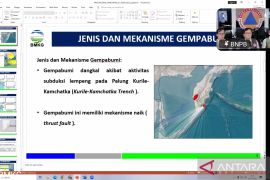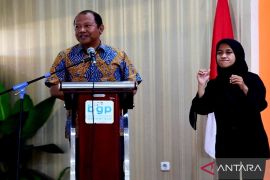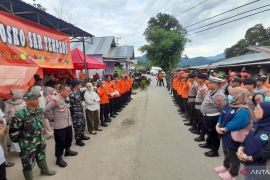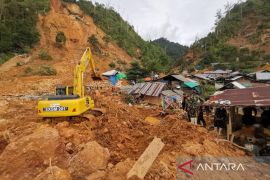At the World Maize Conference we are going to discuss corn in all of its relevant aspects, such as technology, production, markets, and processing industries,"Jakarta (ANTARA News) - Gorontalo is preparing itself to host a World Maize Conference (WMC) in 2012 which it sees as a forum that will bring it one step closer to its goal of becoming a world-class corn producing region.
The provincial government is ready to be the venue of the World Maize Conference in 2012 following its big success in hosting World Food Day celebrations from October 20-23 this year.
Maize, known in many English-speaking countries as corn, is a grain domesticated by indigenous peoples in Mesoamerica in prehistoric times.
After Europeans established contacts with the Americas in the late 15th and early 16th centuries, explorers and traders carried maize back to Europe and introduced it to other countries.
Maize then spread to the rest of the world, including Indonesia, because of its ability to grow in diverse climates.
Gorontalo Corn Information Center chief Mulyadi Mario said on Sunday that the World Food Day celebration in Gorontalo was the province`s first step to prepare itself for the World Maize Conference in 2012.
Corn production had over the past 10 years made significant contributions to Gorontalo province`s economic growth.
Mulyadi said the World Maize Conference was initially to be held in 2011 but it was postponed to next year because the province had to host World Food Day this year.
He said the world maize conference would be a much greater event than the World Food Day celebration.
"At the World Maize Conference we are going to discuss corn in all of its relevant aspects, such as technology, production, markets, and processing industries," he said.
Mulyadi expressed optimism that Gorontalo whose icon was corn would be able to successfully host the WMC-2012.
He said the world maize conference next year would be attended by government officials, businessmen, importers and exporters from many countries.
Meanwhile, a Gorontalo provincial government official, Winarni Monoarfa. said corn from the province was exported to neighboring countries such as Malaysia, Japan, China and South Korea.
She said the province planned to introduce new corn-growing technology to the world during the world maize conference next year considering that world demand for the crop was increasing.
According to her, annual corn production in Gorontalo was predicted to reach 1 million tons this year and projected to increase in the years to come.
Mulyadi Mario, the Gorontalo Corn Information Center chief, also said that in an effort to increase agricultural production the province was currently working to develop genetically-modified or transgenic corn.
Transgenic corn is corn that has undergone a genetic modifying (GM) process which gives it agronomically desirable traits.
Traits that have been engineered into corn include resistance to herbicides and resistance to insect pests, the latter being achieved by incorporation of a gene that codes for the Bacillus thuringiensis (Bt) toxin.
According to Wikipedia, transgenic maize was in 2009 grown commercially in 11 countries, including the United States where 85 percent of the maize crop was genetically modified, Brazil with 36 percent GM), Argentina with 83 percent GM), South Africa with 57 percent GM), Canada with 84 percent GM, the Philippines with 19 percent GM, and and Spain 20 percent GM).
Mulyadi said e transgenic corn produced from genetically-modified seed was resistant to insect pests and pesticides and therefore it has higher productivity than locally produced corn.
He said one hectare of transgenic corn plants could produce 12 to 15 tons of corn but conventional local corn plants are able to yield only three to four tons.
Therefore Mulyadi said Gorontalo was ambitious to be a world-class corn producing province by organizing the World Maize Conference in 2012 after successfully hosting World Food Day.
Vice President Boediono officiated at the the World Food Day celebration in Gorontalo on October 20, 2011 and then toured the field where various food-related objects were on display.
He observed a "corn tower", "sustainable food home", and a World Food Day technology exhibition.
On the occasion, the Vice President also symbolically presented representatives of 71 farmer groups with an aid package for the development of a rural agribusiness community worth Rp 7.1 billion.
Gorontalo Governor Gusnar Ismail at the time said the province was ready to help ensure food security in Indonesia by relying on two commodities namely rice and corn.
In Bone Bolango where the ceremony to observe the 31st World Food Day took place, the governor explained that increased production of both commodities would also boost national food production.
"We are optimistic that Gorontalo will contribute significantly to national food security because of its efforts to develop corn and rice in the past 10 years," Gusnar declared.
Up to 2010 Gorontalo had a 2,250-hectare potential area for rice field with a production capacity of 253,563 tons besides 697,168 tons of corn.
"Gorontalo enjoyed a surplus in the production of the two commodities, and that`s why the province was able to more than meet its own food demand and export the surplus to a number of countries," the governor said.
Meanwhile, Agriculture Minister Suswono said Gorontalo was chosen to host the World Food Day ceremony this year because the province was able to meet its own food needs.
"I hope Gotontalo`s ambition to become a world-class corn producing region will come true and it will be able to contribute to national and even world food security," the minister said.
Indonesia`s paddy production has over the past few years increased significantly with its annual growth recently recorded at 3.2 percent. Rice production stood at over 54.34 million tons and corn production at more than 53 million tons. (*)
Reporter: Otniel Tamindael
Editor: Aditia Maruli Radja
Copyright © ANTARA 2011

